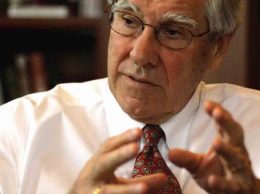Can commercialism, professionalism co-exist in accounting profession?
What we see today in the accounting profession is troubling. Increased commercial activities threatens the independence cornerstone of the profession that underlies its public interest obligation.
Audit firms are pushing the envelope in their involvement with non-audit services that makes it appear as though they might compromise their independence on the audit because of these relationships.
Following the scandals at companies such as Enron and WorldCom, the Sarbanes-Oxley Act (SOX) was passed by Congress in 2002 that limited the non-audit services that audit firms could provide. For a short time CPA firms, especially the Big Four, were on their best behavior. But, all that changed a few years ago as the thirst for new services pushed the firms into new areas of practice that can create the impression that a firm might not be independent in expressing its opinion on the client’s financial statements.
Here are some recent examples. Alarm bells went off in October 2013, when PwC announced it was acquiring the consulting giant Booz & Company. As a result of its acquisition of Booz, PwC added $9.2 billion in global consulting revenue and increased its consulting group’s share of total global firm revenue of $32.1 billion to 28.5 percent, up from 21.7 percent in 2009. Lynn Turner, the former SEC chief accountant, raised an important question about the merger when he asked: “Are the auditors going to serve management, or are they going to serve the best interests of the investing public?”
On January 24, 2014, the SEC found that KPMG violated auditor independence rules by providing certain non-audit services to affiliates of companies whose books KPMG was auditing. The prohibited services included restructuring, corporate finance, and expert services. KPMG also provided prohibited non-audit services such as bookkeeping and payroll to affiliates of another audit client. These relationships create a self-review threat to independence.
In a separate instance, KPMG hired an individual who had recently retired from a senior position at an affiliate of an audit client. KPMG then loaned him back to that affiliate to do the same work he had done as an employee of that affiliate, which resulted in the professional acting as a manager, employee, and advocate for the audit client.
On July 14, 2014, Ernst & Young was sanctioned by the SEC for lobbying on behalf of two of its audit clients, thereby serving as an advocate for an audit client. In the case of one audit client, identified by the SEC only as Client A, the commission cited three lobbying efforts. It said EY had informed the client that a bill was scheduled to be voted on in the House and arranged for a letter supporting the legislation to be delivered to legislative staff members before the vote was taken.
In the second effort, the firm sent a letter to legislative leaders recommending legislation the client wanted, and in the third case it sought an amendment to pending legislation. There was no indication that any of those efforts had any practical effect.
On July 1, 2015, the SEC charged Deloitte & Touche with violating auditor independence rules when its consulting affiliate kept a business relationship with a trustee serving on the boards and audit committees of three funds Deloitte audited.
Deloitte violated its own policies by failing to conduct an independence consultation before starting a new business relationship with trustee, Andrew C. Boynton. Deloitte failed to discover that the required initial independence consultation was not performed until nearly five years after the independence-impairing relationship had been established between Deloitte Consulting and Boynton, who was paid consulting fees for his external client work.
The recent trend of expanding into questionable non-audit services for audit clients is ominous, I believe. The audit profession has a history of reverting to old behaviors after a period of calm.
I believe the SEC needs to investigate the issue of creeping commercialism by audit firms. Perhaps it is time to prohibit all such services for audit clients, while allowing them for clients for whom no audit services are provided.
• Steven Mintz teaches in the Orfalea College of Business at Cal Poly San Luis Obispo. He blogs on ethics issues at www.ethicssage.com.











